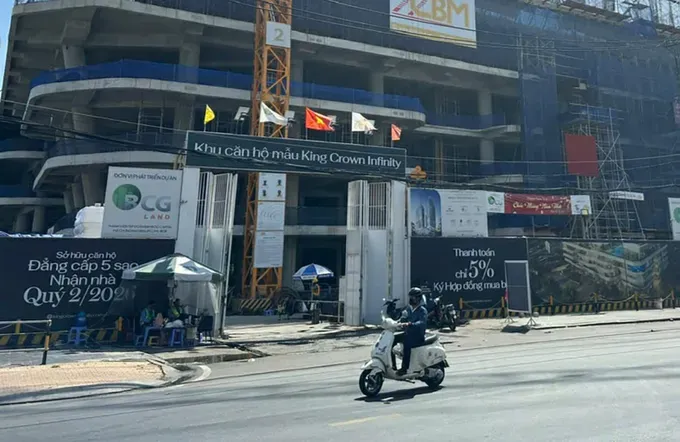The real estate sector plays a vital role in driving economic growth, influencing production chains, capital markets, credit systems, and employment, while primarily addressing the housing demands of the population.

However, a concerning trend is that recent surges in real estate prices have outpaced the financial capacity of those seeking affordable housing.
In several ongoing real estate projects in Ho Chi Minh City, apartment prices are steadily rising. For instance, the initial sales phase of the Eaton Park project by Gamuda Land, located on Mai Chi Tho Street in An Phu Ward of Thu Duc City launched in April 2024 had starting prices from VND120 million (US$4,600) per square meter. In the second phase, towers A1 and A2 are being offered at an average price of VND145 million per square meter.
Similarly, at the King Crown Infinity project on Vo Van Ngan Street, Thu Duc City, brokers have advertised prices ranging from VND99 million–130 million per square meter. However, according to one agent, the official sales launch expected at the end of 2024 may offer units at around VND80 million–90 million per square meter.
Beyond the Ho Chi Minh City core, the La Pura project on te Highway 13 in Thuan An City of Binh Duong Province began sales in April 2025, with units priced between VND46 million–VND58 million per square meter. The Phu Dong SkyOne project in Di An City was launched in March 2024 with an average price of approximately VND31.5 million per square meter.
Prices for resale apartments are also trending upward over time.
Real estate investor Nguyen Van Hung in Ho Chi Minh City's Binh Thanh District noted that prices for individual houses in certain areas of the city have been steadily rising over time. While some homeowners, needing to sell urgently, may offer properties at reduced prices, the overall trend shows real estate values consistently surpassing those of the previous year. Mr. Hung further explained that individual houses in inner-city areas, consigned for sale through his company, have seen price increases ranging from VND50 million to VND300 million compared to early 2025.
Data from Cho Tot - a well-konwn real estate platform - indicates that the selling prices of individual houses and street-front properties across various districts in Ho Chi Minh City have risen by an average of over 7 percent compared to April 2025.
A resident of Tan Phu District shared that three months ago, she purchased a 50 square meters, two-bedroom apartment in District 11 for VND2.9 billion. Recently, a broker contacted her, informing her of a potential buyer willing to purchase the same apartment for VND3.3 billion.
Improved legal issues help increase housing supply
According to the report of the Ho Chi Minh City Department of Construction, from 2021 to now, the real estate market in Ho Chi Minh City has been quite gloomy. Specifically, the growth rate of the market in 2021, 2022, 2023, 2024 was -5.08 percent, 8.3 percent, -6.38 percent and 2.6 percent respectively.
Although real estate businesses have implemented various strategies to boost sales, the supply of real estate products released to the market remains limited, failing to meet the city's housing demands, particularly with social housing being available only in very small quantities.
Additionally, according to statistics from the Ho Chi Minh City Department of Construction, the housing supply in recent years has been quite low. For instance, in 2024, the department issued 8 notices confirming that commercial housing projects are eligible to mobilize capital for future housing products for 6 projects, including 3,845 houses in the high-end segment.
In 2023, Ho Chi Minh City will have 19 commercial housing projects eligible for sale and lease-purchase of future housing products, of which the high-end segment has 11,334 units and the mid-range segment has 5,051 units, with no housing in the affordable segment.
In response to the current real estate development, some experts in the field believe that soaring property prices are largely driven by limited supply amid high housing demand.
Chairman Le Hoang Chau of the Ho Chi Minh City Real Estate Association explained that the cost of developing commercial housing land—particularly land transfer fees—has surged due to a significant increase in the official land price list. In some locations, these prices have risen by more than three to 38 times compared to previous levels. As a result, market land prices have also climbed accordingly.
A key factor further pushing up housing prices is the prolonged administrative and legal bottlenecks faced by many projects. Between 2015 and 2023, 68 projects were halted or canceled, and over 345 others remained stalled due to a lack of available land.
Chairman Le Hoang Chau emphasized that resolving these issues would boost housing supply and create downward pressure on prices noting that when supply increases, businesses will have to compete by lowering prices.
Meanwhile, Professor Dang Hung Vo pointed out that asset accumulation behavior, price inflation tactics, and speculation also contribute to the real estate price surge. According to him, speculators often manipulate public perception to make price hikes seem inevitable.
At the meeting on the real estate market situation in May 2025, the Permanent Government directed ministers and heads of agencies and chairpersons of provincial and municipal people's committees to review and immediately clarify the causes of the increase in real estate price structure comprising land price, raw material price, loan interest while urgently developing plans to reduce factors that increase real estate prices, increase access to real estate and increase supply.
Moreover, ministers and heads of agencies and chairpersons must adopt support policies for home buyers with real needs, young people, increase people's access to housing and real estate and strictly penalize organizations and individuals exploiting auctions to inflate land prices, which negatively impacts and obstructs the real estate market.
























